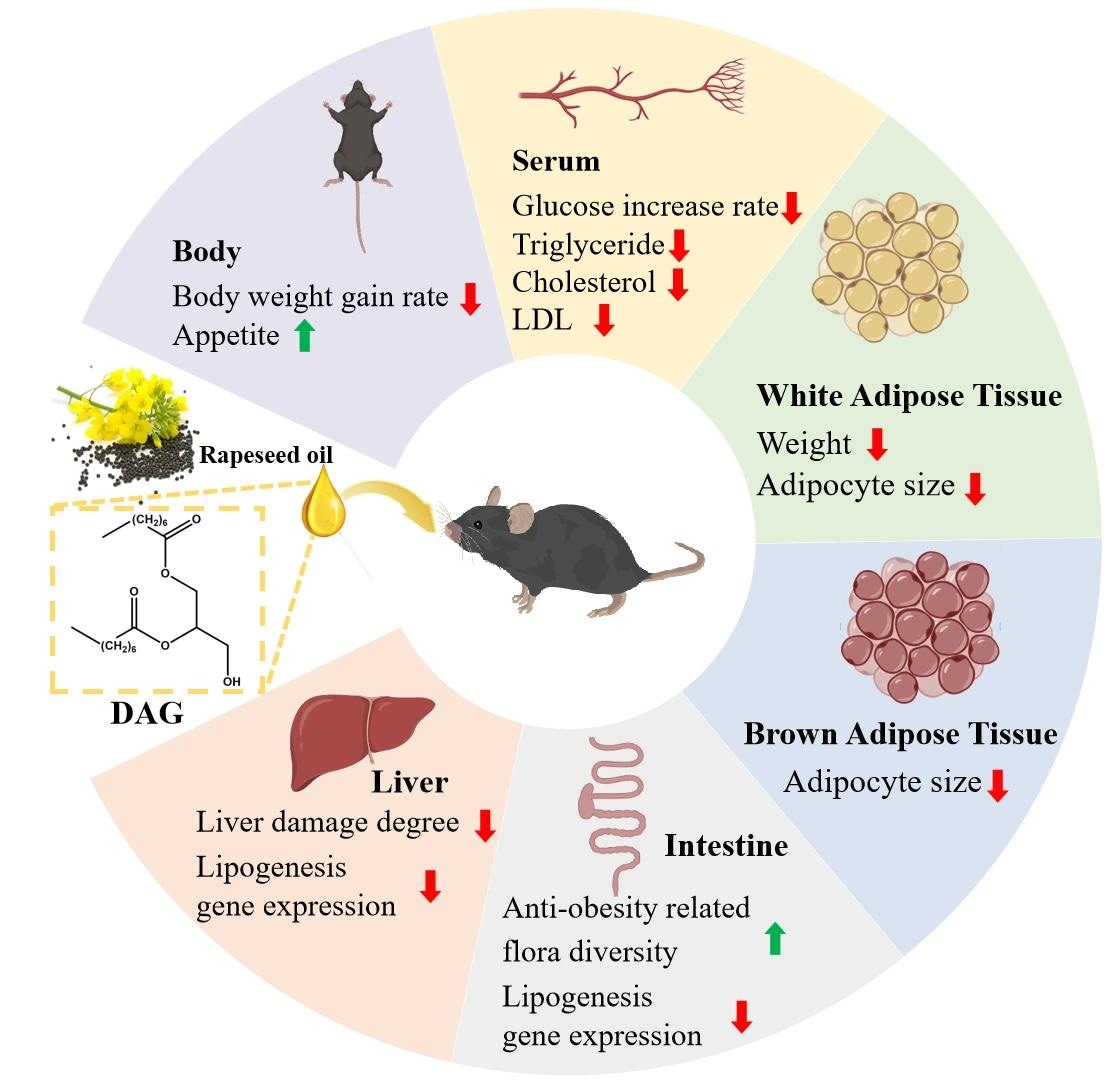Rapeseed oil is a widely used vegetable oil; however, excess consumption of this oil may contribute to obesity. A recent study published in the journal Nutrients examines how rapeseed diacylglycerol oil (RDG) used as a functional fat may impact fat accumulation and metabolism in a mouse model.
Obesity refers to excessive adiposity due to abnormal fat accumulation and arises following the chronic and excessive intake of energy relative to energy expenditure. Obesity is associated with various health conditions, including type 2 diabetes, hypertension, cardiovascular disease, and several types of cancer.
With the prevalence of obesity continuing to rise, researchers estimate that about four billion people may be obese by 2035. Thus, obesity prevention is an important research area for public health.
There are three different types of adipose tissue: white adipose tissue (WAT), brown adipose tissue (BAT), and beige adipose tissue. WAT is a crucial source of triacylglycerol (TAG), the end-product of fat digestion following excessive energy intake.
BAT and beige adipose tissue are metabolically active and allow energy to escape as heat. This heat production arises due to non-oxidative uncoupling, which subsequently leads to higher glucose uptake by fat cells and increased lipid metabolism. Thus, activating these forms of adipose tissue could be important for alleviating the metabolic imbalance of obesity.
Decreasing the amount of WAT and increasing the amount of BAT is crucial to accelerating lipid metabolism and preventing obesity.”
Oils in the human diet
Oils are important sources of essential fatty acids, vitamins, and other fat-soluble nutrients. However, excessive oil intake in food increases the risk of obesity.
Diacylglycerol (DAG) is found in small proportions in natural oils. It has been proposed as a healthy replacement for TAG-rich oil because DAG does not convert to TAG or TAG chylomicrons, which are associated with obesity.
TAG is converted into chylomicrons in the small intestine, these being stored in fatty tissue. Comparatively, DAG supplies energy and regulates fat metabolism, thereby improving insulin sensitivity, regulating blood lipid levels, and reducing visceral fat.
DAG may also reduce abnormal blood clots and certain cardiovascular disease risk factors such as high glucose and lipid levels. Additionally, DAG enhances fat digestion by promoting fatty acid release into the intestines.
Rapeseed oil is the major vegetable oil in China and consists of unsaturated fatty acids. RDG is thus poised to replace conventional vegetable oils, including rapeseed oil, in oil-rich modern foods. This motivated the current study that compared the effectiveness of RDG with rapeseed triacylglycerol oil (RTG) on obesity-related parameters and clinical syndromes in obese mice
About the study
The current study compares serum glucose levels in obese mice in a high-fat dietary trial. In the RDGM group, mice were fed a high-fat diet (HFD) for eight weeks followed by 12 weeks of RDG, with 45% of the total energy from RDG oil.

Graphical Abstract
For the RTGM group, which included mice fed an HFD for eight weeks followed by 12 weeks of RTG, the RTG oil. A control group provided a control diet for 20 weeks, a 20-week high-fat dietary group (HFD), and an RDG group given an RDG diet for 20 weeks were also included in the analysis.
All groups except controls obtained 45% of their energy from oil. At eight weeks, all groups exhibited a mean increase of 20% in body weight as compared to controls, thus indicating obesity had been achieved.
RDG benefits in obese mice
RDGM-obese mice had lower fasting blood glucose levels than the RTGM group. Blood ketone levels also declined, indicating a reduced metabolic burden. Serum triglyceride levels in the RDGM group were also 26% lower than those in the RTGM group.
The RDGM group exhibited significantly slower weight gain than the RTGM group. RDGM and RDG mice also exhibited reduced WAT index and became thinner than RTGM mice.
Liver size in RDG mice resembled that of controls, whereas RTGM mice had the largest livers, followed by RDGM mice. The liver structure exhibited beneficial changes following RDGM intervention as compared to RTGM, thus indicating improved lipid metabolism in both the intestines and the liver. Triglyceride levels were reduced in RDGM mice as compared to the RTGM group; however, high-density lipoprotein (HDL) and total cholesterol levels were similar.
Transcriptional effects were also observed in the RDGM group. Reduced expression of peroxisome proliferator-activated receptor γ (PPAR-γ) and diglyceride acyltransferase (DGAT) genes, both of which are related to fat accumulation, was observed in the intestines and liver. More specifically, PPAR-γ expression in the liver and intestines was reduced by 22% and 7%, respectively, compared to nearly 40% and 47% for DGAT, respectively.
Fat breakdown in BAT was unchanged, with little alteration in lipolytic gene expression. This observation suggests RDG-associated alterations in the expression of adipogenic genes in fatty tissue, liver, and intestine, which leads to reduced white fat deposits with smaller fat cell size.
RDG consumption was associated with greater gut microbial diversity. The changes in various species could enhance lipid metabolism, thereby producing beneficial effects.
Conclusions
The RDGM dietary intervention in obese mice was associated with beneficial effects, including improved body type, reduced obesity-related indices, a more diverse gut microbiome, restricted adipogenesis, and improved lipid metabolism in multiple key tissues.
Given that RDG has the potential to decrease liver damage and regulate cholesterol metabolism, this relationship suggests that RDG intake can regulate lipid metabolism.”
Journal reference:
- Mao, Y., Zheng, D., He, L., et al. (2024). The lipid-metabolism-associated anti-obesity properties of rapeseed diacylglycerol oil. Nutrients. doi:10.3390/nu16132003, https://www.mdpi.com/2072-6643/16/13/2003